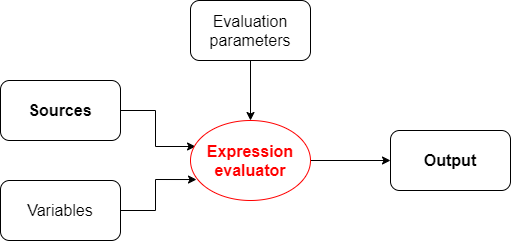
Thoughts on integration of data and metadata processing
To recall, an expression evaluator converts sources and input variables to output values (under given evaluation parameters).

Each value being processed can have its own value metadata and, therefore, we have to process this metadata along with the data.
Metadata can be present on values from both sources and variables but for the time being we will explicitly deal with metadata from sources only.
Where to put metadata support?
Should the metadata support start at the level of expression, or it is sufficient to support it for mappings?
The answer depends on whether there are mapping-less expressions that produce values that ultimately end somewhere in midPoint objects. It seems like there are some:
Category 1: Usually covered by "outer" mapping
-
PopulatorUtil.evaluatePopulateExpressionIt is called when populating assignment in auto-assignment scenarios, and also when creating assignments and/or objects in target search expression evaluators. However, the execution of these expressions is usually done in the context of a mapping. -
ExpressionUtil.evaluateFilterExpressionsInternalWe use expressions to evaluate filters that might be used e.g. for target search in other expressions. Values in the filters are not important per se. What is important are objects that result from these searches. (Like roles when we are searching them by name.) Fortunately, the most probable context for these filter expression evaluation (that leads to inclusion of some values in objects) is target search expression i.e. something done in the context of a mapping.
Category 2: Generating item values for objects but not executing in a mapping (probably need to process metadata)
-
LensUtil.formatIterationTokenIteration token itself can contain sensitive information. -
ObjectMergerIt computes merged values via expressions.
Category 3: Generating item values for objects, but probably not requiring metadata processing, at least not now
-
VariablesUtil- evaluation of variables for bulk actions (can somehow sneak into objects) -
ScriptingTaskCreator- customizes scripting task (the task will contain generated values) -
SynchronizationExpressionEvaluator.createTag- creates tag for a projection (multi-intents) -
PerformerCommentsFormatterImpl- provides approver comments in string form - this is really ugly case but still valid. -
ClockworkAuditHelper.auditEvent- values for custom audit columns (not important for now, maybe in the future) -
Individual scripting actions that modify objects using custom values (
execute-script,modify, …)
So, metadata processing will be declared and executed at the level of mapping evaluation. But there will be some support from expression evaluators, mainly because of the combinatorial (relative) evaluation of scripts and other value-transforming expression evaluators.